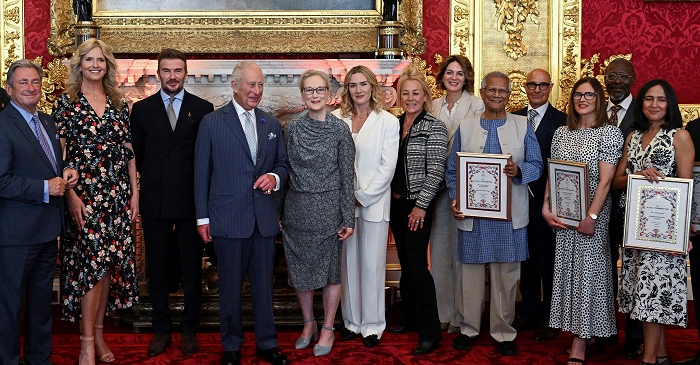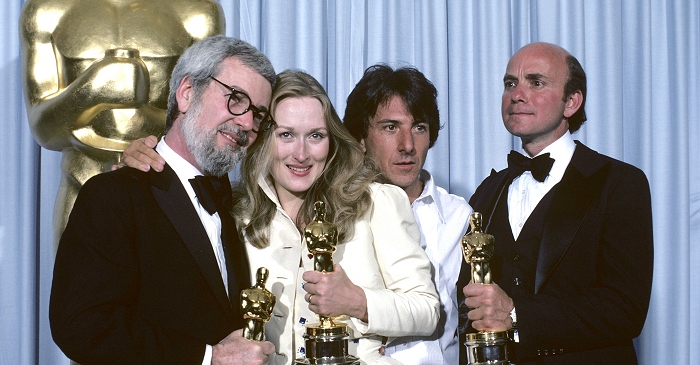|
Simply Streep is your premiere online resource on Meryl Streep's work on film, television and in the theatre - a career that has won her acclaim to be one of the world's greatest living actresses. Created in 1999, Simply Streep has built an extensive collection over the past 25 years to discover Miss Streep's body of work through thousands of photographs, articles and video clips. Enjoy your stay and check back soon.
|
|
Meryl Streep Soars in "Music of the Heart"
The Chicago Tribune ·
October 29, 1999
· Written by Michael Wilmington
|
Movies that honestly touch your heart are rare – which is one reason among many to treasure “Music of the Heart.” The title may sound sappy, but the film itself – which is about the real-life struggle of East Harlem music teacher Roberta Guaspari (Meryl Streep) to keep her violin class in the face of ruinous public school budget cuts – has a wonderful spirit, humanity and humor. It’s a tribute to Roberta’s skill and tenacity, of course, but it’s also a celebration of the best teachers everywhere – and the ways the best of them impact on our lives. The movie is also a tribute to the power of art – and especially music – to renew and inspire us: in this case, to rally Roberta’s East Harlem kids to rise above harsh backgrounds and dangerous streets and take control of their lives. Seeing Roberta’s fights first to recover from a traumatic divorce, then to establish herself as a teacher and raise two boys and finally to save her highly successful class in 1990 becomes, unexpectedly, a thrilling spectacle, In fact, I watched it with the total absorption and pumping heart I usually reserve for championship sports battles. When this battle is carried (as it was in life) all the way to Carnegie Hall – and a benefit concert to which violin virtuosos Isaac Stern and Itzhak Perlman (among others) gallantly lend their hands and bows – the excitement hits a magnificent crescendo.
Guaspari’s history was already told in a sometimes wonderful little 1987 documentary called “Small Wonders,” directed by Allan Miller (one of “Music of the Heart’s” four producers.) That film followed the backstage story of the Carnegie Hall concert, climaxing in the rousing massed performance of Bach’s Double Concerto by Roberta’s pupils, ex-pupils and guests. But “Music of the Heart” shows us more, dramatizing Roberta’s life in ways both convincing and punchy. The volatile relationship between a single working mother and her sons is often botched in movies. Here Streep and the filmmakers get it right, show us the tensions a perfectionist like Roberta stirs up, the conflicts that tear up the family and the loyalties that mend it. The blighted love affair between Roberta and Aidan Quinn’s roving journalist Brian Sinclair is also well-done – especially when it ends. I loved the scenes where we see Roberta teaching: the electric and none-too-gentle interactions between tutor and pupils (especially her all-important first class). And though the school crises, mostly finessed by Angela Bassett as Janet Williams (the kind of principal I wish we’d had), are more conventional, they get our motors racing. By the time we reach the concert, in fact, there has been so much turmoil, it’s almost an anticlimax. Why does this film work so well? Partly because of master actress Streep, who conveys the essence of this stubborn mother and dedicated teacher without sentimentalizing her or condescending to us.
Partly it’s due to the fine script by Pamela Gray (“A Walk on the Moon”). Partly it’s the unusually good supporting cast (especially Cloris Leachman as Roberta’s mom and all the child actors who play Roberta’s students and sons). And partly it’s due – wonder of wonders – to the sturdy and sensitive direction of a veteran filmmaker we never expected would make a film like this, a man more used to filling the screens with blood than with music: Wes Craven of “Nightmare on Elm Street” and the “Scream” series. You may not believe that the moviemaker who began his career with the grisly “Last House on the Left” and later unleashed dream killer Freddy Kreuger had a heart at all (except the ones he’d chewed up and swallowed). Or that he could pull off the kind of warm drama you’d expect from a Robert Mulligan or an Alan Pakula. But, as usual, you’re in for a shock. This horrormeister’s ability to envelop audiences in terror and drench them with emotion turns out to be exactly right for this movie. As for Streep, she proves again that, like many other older American movie actresses, she’s a wondrous, often wasted resource. Haven’t Streep and Susan Sarandon (also considered for Roberta) definitively blasted the old cliche about movie actresses ending their star careers at 40? At 48, Streep acts (and looks) better than ever. Her Roberta is out-and-out great acting – which is what we expect of her. Streep gives us Roberta’s temper, pain, guts, obsessive drive, thorniness and idealism, good points and bad. She even shows off unexpected musical skills, playing no mean violin, even when side by side with Stern and Perlman.
A confession. In the last 20 years, Craven’s first “Nightmare on Elm Street” is the only horror movie that ever really scared me. And “Music of the Heart” is one of a handful of movies this year that made me cry. I’ve always liked Craven’s work and I consider him underrated by many mainstream critics. “Music of the Heart” proves my point. But it wasn’t just the story that got to me. Like Roberta’s boys, I was the son of a single working mother: a fine, inspiring art teacher who had stormy conflicts with her not-very-bright superiors. I know the truth at the heart of this movie: how stupid and wasteful it is when governments strangle educational programs or dismiss art as a frill. Look how one determined music teacher changed lives here – taking her students from a bare East Harlem classroom to soar with Bach in Carnegie Hall. “Music of the Heart” is a saccharine title. But don’t let that keep you from one of the year’s most moving, musical and heart-stirring movies.










